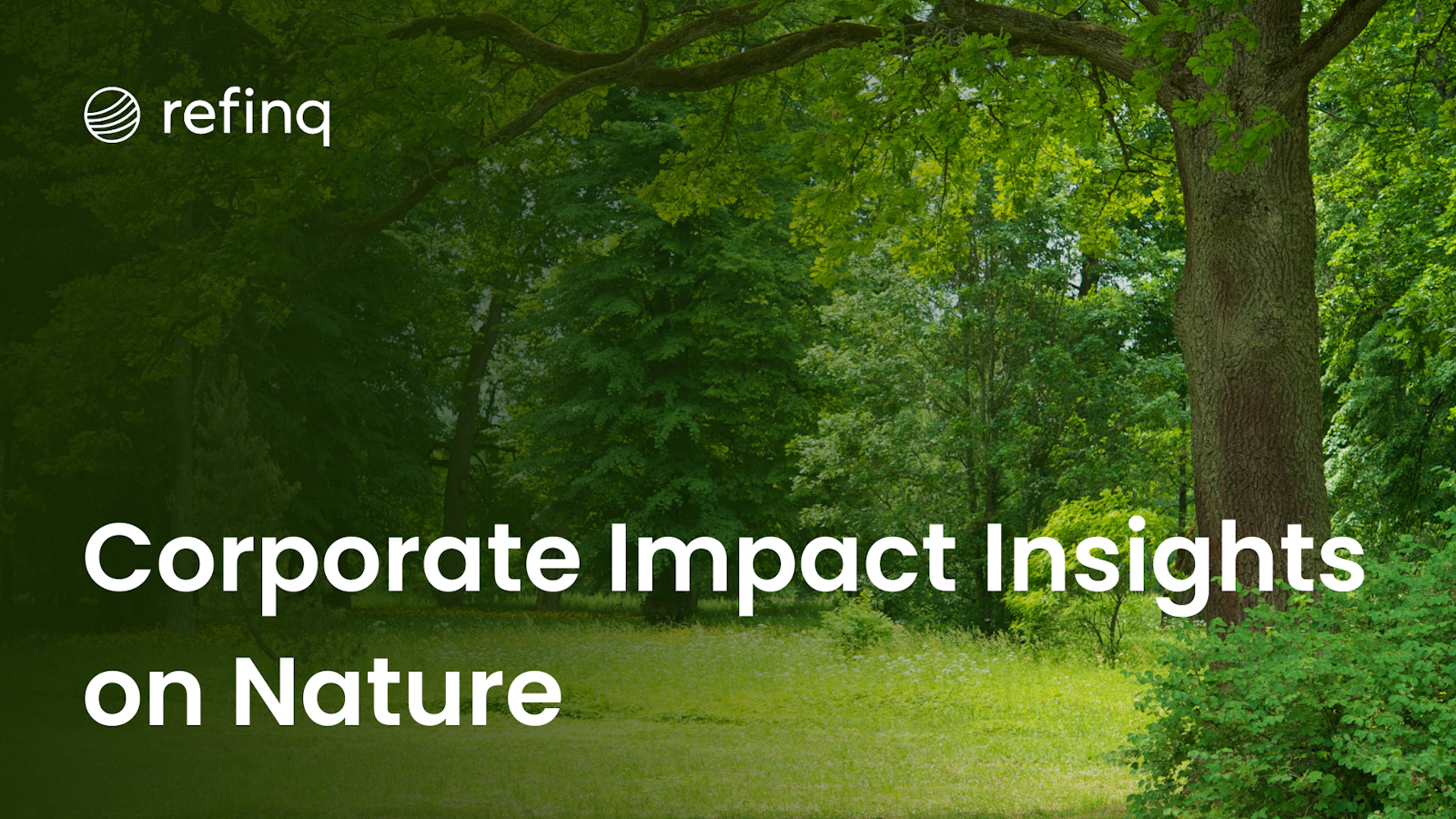

Nature reporting has become a cornerstone of corporate sustainability, focusing on the assessment of impacts on ecosystem services and biodiversity. Businesses face growing pressure to align their strategies with nature-positive goals, as biodiversity loss directly affects operational resilience. An open-source approach to measuring these impacts offers actionable insights into corporate dependencies on ecosystems and drives accountability. (Explore the foundational article on nature reporting). Platforms like refinq enhance the accuracy of nature-related reporting by integrating real-time data analysis and geospatial insights. (Learn more about refinq’s role in nature risk management).
Nature reporting focuses on documenting and analyzing corporate impacts on ecosystems, biodiversity, and nature-related dependencies. It plays a pivotal role in achieving global sustainability goals, as businesses integrate nature-positive frameworks into their operations. Reporting frameworks like the Taskforce on Nature-related Financial Disclosures (TNFD) and the Corporate Sustainability Reporting Directive (CSRD) guide companies in aligning their practices with global biodiversity objectives. (Read about TNFD’s approach to nature reporting).
Addressing Ecosystem Dependencies
Companies depend on services like pollination, water purification, and climate regulation. Nature reporting identifies these dependencies, enabling businesses to mitigate risks and optimize resource management. (Explore corporate dependencies on nature).
Aligning with Regulatory Standards
Frameworks such as TNFD and CSRD mandate nature-related disclosures, compelling businesses to adopt transparent reporting practices. Non-compliance risks reputational damage and legal penalties. (Learn about nature reporting under CSRD).
Enhancing Stakeholder Trust
Transparent nature reporting builds trust among investors, regulators, and consumers by showcasing a company’s commitment to sustainability.
Nature reporting involves various metrics to assess biodiversity impacts and dependencies:
Habitat Quality: Evaluating the condition of natural habitats affected by corporate activities.
Species Abundance and Diversity: Monitoring species populations and ecosystem health.
Ecosystem Service Value: Assessing the economic value of services like water purification and carbon sequestration. (Learn about metrics for biodiversity reporting).
Platforms like refinq incorporate these metrics into comprehensive assessments, enabling actionable reporting. (See how refinq simplifies nature metrics).
Data-Driven Decision-Making
Nature reporting equips businesses with actionable insights to optimize operations and reduce environmental impacts.
Policy Development
Accurate reporting informs the creation of sustainable policies, aligning business goals with global biodiversity targets. (Explore how nature metrics inform policies).
Complexity of Data Collection: Gathering comprehensive biodiversity data can be resource-intensive.
Lack of Standardization: Inconsistent reporting frameworks create difficulties in benchmarking. (Read more about challenges in nature reporting).
Enhanced Transparency: Accurate reporting builds stakeholder trust and competitive advantage.
Innovation: Identifying biodiversity risks fosters innovation in sustainable practices.
The integration of open-source data and methodologies enhances the precision and accessibility of nature reporting. Key aspects include:
Data Accessibility
Open-source platforms provide cost-effective tools for biodiversity monitoring and ecosystem assessments.
Standardized Methodologies
Shared frameworks enable consistent measurement of corporate impacts, fostering comparability across industries. (Explore the benefits of open-source approaches).
Technological Integration
Platforms like refinq utilize geospatial analysis to process data with a granularity of up to 25 meters, delivering actionable insights into biodiversity impacts. (Learn how refinq integrates open-source data).
Identifying Risks and Opportunities
Nature reporting allows companies to identify biodiversity-related risks and turn them into opportunities for innovation and resilience.
Improving Operational Efficiency
By understanding nature-related dependencies, businesses can optimize resource allocation and reduce environmental impacts. (Explore insights into sustainable operations).
Strengthening Compliance and Accountability
Comprehensive reporting aligns businesses with evolving regulations, ensuring long-term compliance and sustainability.
Businesses: Companies gain insights to optimize operations, enhance brand reputation, and attract sustainability-focused investors.
Regulators: Comprehensive reporting ensures compliance with frameworks like CSRD and TNFD.
Communities: Local communities benefit from preserved ecosystems and sustainable resource management. (Learn about the societal benefits of nature reporting).
refinq empowers businesses to navigate the complexities of nature reporting with its advanced analytics tools. By processing over 2.5 billion data points, refinq enables companies to measure biodiversity impacts, assess risks, and develop nature-positive strategies. (Explore refinq’s biodiversity tools).
refinq’s integration with frameworks like TNFD and CSRD simplifies compliance, providing audit-ready reports and actionable insights. Its geospatial analysis capabilities help businesses map dependencies on ecosystem services and identify areas for improvement. (Learn about refinq’s alignment with global standards).
Nature reporting is a vital aspect of modern business strategies, enabling companies to understand and mitigate their impacts on ecosystems. By leveraging open-source methodologies and platforms like refinq, businesses can enhance transparency, ensure compliance, and drive sustainable growth. The path to achieving global biodiversity goals begins with actionable insights and a commitment to nature-positive practices.
Naturemetrics: Beware Nature, the CSRD is Not Taking Care of the State of You
Ricardo: Nature Reporting Supporting Your Sustainability Goals